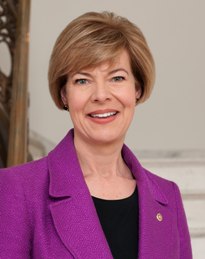Will Tammy Baldwin Draw an A-List GOP Challenger in 2024?
Incumbent Badger State Democratic U.S. Senators have been unseated three times – each during GOP wave cycles

As of yet, the allure of an expected very competitive presidential race at the top of the ticket in Wisconsin has yet to persuade any Republican to take the plunge.
To be sure, some GOP candidate will eventually file paperwork, no matter what the odds look like of unseating Baldwin.
Republicans have fielded a nominee in each of the 40 general and special elections for the office since 1914.
But Baldwin’s reelection prospects look strong. Wisconsin Democratic U.S. Senators have won 13 of 16 reelection bids during the direct election era – falling short during only three Republican wave elections:
- 1938 (eight-seat GOP gain): One-term Senator F. Ryan Duffy placed third with 24.7 percent behind winner Alexander Wiley and Progressive Herman Ekern
- 1980 (12-seat GOP gain): Three-term Senator Gaylord Nelson lost to former U.S. Representative Bob Kasten by 1.9 points
- 2010 (six-seat GOP gain): Three-term Senator Russ Feingold was unseated by 4.8 points by Ron Johnson
Republicans have never won a U.S. Senate seat in Wisconsin during a presidential election cycle in which the Democratic White House nominee carried the state – losing races for both offices in 1932, 1964, 1976, 1988, 1992, 2000, 2004, and 2012.
The Wisconsin GOP has plenty of company in this regard: 18 states have never simultaneously elected a Republican U.S. Senator while backing a Democratic presidential nominee.
Wisconsin, however, ranks near the very bottom in split ticket voting for these two offices.
In fact, Wisconsin has split its presidential and U.S. Senate vote between Republican and Democratic nominees just once in 18 cycles since 1916.
In 1968, Richard Nixon eked out a 3.6-point victory in Wisconsin over Vice President Hubert Humphrey while Gaylord Nelson cruised to a 23.4-point win against GOP State Senator and former Milwaukee Assemblyman Jerris Leonard.
[Note: Additionally, in 1940, Wisconsinites also reelected Progressive U.S. Senator Robert La Follette, Jr. and backed Democrat Franklin Roosevelt for a third consecutive cycle].
There are several well-known Republicans still considering a campaign for the U.S. Senate in 2024 against Baldwin, including former Milwaukee County Sheriff David Clark and U.S. Representative Tom Tiffany.
It is not likely, but it is possible, that whoever enters the GOP race will have a clear path to the nomination.
Since 1914, Republicans have held uncontested primaries nine times out of 40 U.S. Senate elections including six cycles with Democratic incumbents:
- 1958: Former State Supreme Court Justice Roland Steinle
- 1964: Sun Prairie agricultural businessman Wilbur Renk
- 1970: Former Milwaukee Bucks General Manager John Erickson
- 1976: Former River Falls State Assemblyman and State Energy Director Stanley York
- 1998: U.S. Representative Mark Neumann
- 2006: Bear Creek attorney Robert Lorge
Baldwin is the only woman to serve in the U.S. Senate in Wisconsin history and in 2018 the state hosted its first general election between two women major party U.S. Senate nominees, with State Senator Leah Vukmir winning the Republican nomination.
Follow Smart Politics on Twitter.

Unrelated to the article, but since so many of us share an inexplicable fascination with the SEN –> GOV pathway…
Today’s news that Gov. Chris Sununu (R-NH) will not seek re-election in 2024 almost certainly means that former Sen. Kelly Ayotte will run for the seat, joining the list of U.S. senators defeated for re-election who later ran for their state’s governorship. In the 21st century this list includes Lincoln Chafee (I-RI) and Mike DeWine (R-OH), as well as unsuccessful candidates Mark Begich (D-AK), Dean Heller (R-NV), and David Perdue (R-GA).
Chafee, Begich, and Heller each ran 4 years after losing their Senate seats; Perdue ran just 2 years following his defeat while DeWine waited 12 years [though he waited only 4 years before becoming state attorney-general]. Ayotte would be running 8 years after her 2016 re-election loss to then-Gov. Maggie Hassan.
If she wins, Ayotte would be the third woman in U.S. history to serve as both governor and U.S. senator — after Jeanne Shaheen and Maggie Hassan.
The following is a complete list of women who ran in elections for both governor and U.S. senator, winning at least one:
*Gladys Pyle (R-SD): candidate for gov. 1930; sen. 1938-39
*Hazel Abel (R-NE): sen. Nov.-Dec. 1954; candidate for gov. 1960
*Dianne Feinstein (D-CA): nominee for gov. 1990; sen. 1992-present
*Christine Todd Whitman (R-NJ): nominee for sen. 1990; gov. 1994-2001
*Joan Finney (D-KS): gov. 1991-95; candidate for sen. 1996
*Kay Bailey Hutchison (R-TX): sen. 1993-2013; candidate for gov. 2010
*Susan Collins (R-ME): nominee for gov. 1994; sen. 1997-present
*Debbie Stabenow (D-MI): candidate for gov. 1994; sen. 2001-present
*Mary Landrieu (D-LA): candidate for gov. 1995; sen. 1997-2015
*Heidi Heitkamp (D-ND): nominee for gov. 2000; sen. 2013-19
*Linda Lingle (R-HI): gov. 2002-10; nominee for sen. 2012
*Mazie Hirono (D-HI): nominee for gov. 2002; sen. 2013-present
*Claire McCaskill (D-MO): nominee for gov. 2004; sen. 2007-19
Perdue lost his re-election bid in 01 of _2021_, making him an also-ran for US senator and state governor in the SAME CYCLE (he did post first place in the initial/regular 2020 balloting ahead of Ossof).
Note that all Republican Senate nominees who won uncontested primaries lost to Democratic incumbents in the General Election. Conclusion: Nobody else thought it was worthwhile to seek the GOP nomination in those years because the incumbent had it in the bag.
[…] Five months ago Smart Politics posited whether Wisconsin U.S. Senator Tammy Baldwin would draw a top-tier Republican challenger in what should be a competitive state for the GOP as it attempts to flip the chamber. […]